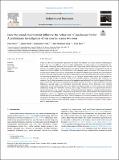Does the sound environment influence the behaviour of zoo-housed birds? A preliminary investigation of ten species across two zoos
Abstract
In the zoo, the sound environment experienced by captive wild animals will contain numerous anthropogenic features that may elicit different responses to those stimulated by naturally created, or more biologically relevant, sounds. Husbandry activities, visitor presence and neighbouring species (free-living and captive) will all influence the sounds around zoo-housed species; an animal's behavioural responses may therefore provide an insight into how its welfare state is influenced by this changing sound environment. This project aimed to investigate how animal behaviour was influenced by the sound environment at two large UK zoos; one situated in a more rural location and the other in an urban location. Species were selected based on their location in the zoo, the relevance of sound to their natural ecology (e.g., as a form of communication and/or for anti-predator responses) and their novelty as research subjects in the scientific literature. Behavioural data collection was conducted for five days per enclosure per zoo at the population and individual level for birds housed in different styles of enclosure. Instantaneous sampling at one-minute intervals was used to collect information on state behaviours, assessed using a pre-determined species-specific ethogram. Event behaviours were collected continuously for each observation period. The sound environment around or in the enclosure was recorded continuously during each behavioural recording session using a recorder mounted on a tripod. Results showed a variety of responses to the presence of visitors and potential associated changes to sound around the enclosure with some behaviours being more influenced by the presence of visitors (and increases in the volume of sound) compared to others, e.g., vigilance and vocalisations. Overall, birds showed few of the changes thought to indicate poor or impoverished welfare states linked to changes to the sound environment in their enclosure or to the presence of visitors, but we recommend that zoos consider further measurement and recording of sound on a species-by-species basis to capture individual responses and behavioural changes to variation in visitor number and the sound environment.
Citation
Rose , P , Reed , A , Hurn , S , Badman-King , A & Rice , T 2022 , ' Does the sound environment influence the behaviour of zoo-housed birds? A preliminary investigation of ten species across two zoos ' , Behavioural Processes , vol. 203 , 104763 . https://doi.org/10.1016/j.beproc.2022.104763
Publication
Behavioural Processes
Status
Peer reviewed
ISSN
0376-6357Type
Journal article
Description
Funding: This study was made possible thanks to an Economic & Social Research Council grant number ES/R009554/1.Collections
Items in the St Andrews Research Repository are protected by copyright, with all rights reserved, unless otherwise indicated.

